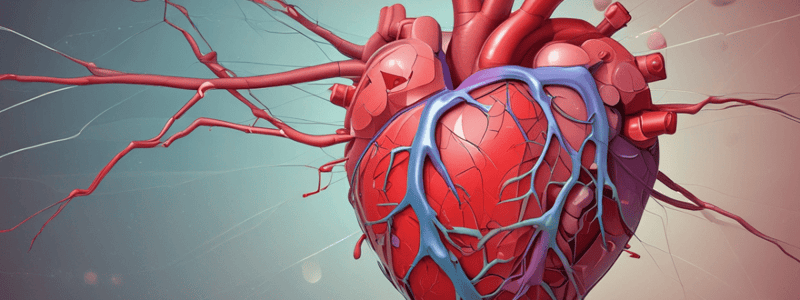Podcast
Questions and Answers
Which of the following drugs are direct Factor XA inhibitors?
Which of the following drugs are direct Factor XA inhibitors?
- Dabigatran
- Rivaroxaban (Xarelto) (correct)
- Enoxaparin
- Apixaban (Eliquis) (correct)
Warfarin is a Vitamin K antagonist.
Warfarin is a Vitamin K antagonist.
True (A)
What is the antidote for Dabigatran?
What is the antidote for Dabigatran?
Praxbind
Heparin is preferred for use during ___.
Heparin is preferred for use during ___.
What is the primary use of Clopidogrel?
What is the primary use of Clopidogrel?
What is one major side effect of Fondaparinux?
What is one major side effect of Fondaparinux?
The major adverse effect associated with heparin includes ___.
The major adverse effect associated with heparin includes ___.
Flashcards are hidden until you start studying
Study Notes
Anticoagulants and Antiplatelets
- Anticoagulants reduce the formation of fibrin by inhibiting synthesis of clotting factors, including factor X and thrombin, or by inhibiting the activity of clotting factors.
Mechanisms of Anticoagulants
- Warfarin: inhibits synthesis of clotting factors, including factor X and thrombin; reversal with Vitamin K.
- Heparin and enoxaparin: activate antithrombin.
- Direct Thrombin Inhibitor: dabigatran; reversal with praxabind.
- Direct Factor XA Inhibitors: fondaparinux, rivaroxaban, apixaban, edoxaban; reversal with andexxa for rivaroxaban and apixaban.
Antiplatelets
- ASA, clopidogrel, and vorapaxar: inhibit platelet aggregation.
Heparin
- Inactivates thrombin and factor Xa.
- Administered subcutaneously, with rapid onset.
- Preferred for use during pregnancy, in situations requiring rapid onset of effects, and in open heart and renal dialysis.
- Low-dose therapy used to prevent postoperative venous thrombosis and in DIC.
- Adverse effects: hemorrhage, HIT; caution with renal and liver patients.
- Contraindications: low platelet count, uncontrollable bleeding, recent eye/brain/spinal surgery, lumbar puncture, or regional anesthesia.
- Monitoring: PTT or anti-Xa level.
- Antidote: protamine sulfate.
Low-Molecular-Weight (LMW) Heparins
- Fixed single dose, no PTT monitoring required, and can be used at home.
- First-line therapy for DVT prevention and treatment.
Fondaparinux
- Enhances activity of antithrombin to cause inhibition of factor Xa.
- Uses: DVT prevention post-surgery, PE with warfarin, DVT with warfarin.
- Use with caution in renal patients; do not use with patients weighing <65 kg.
- Adverse effects: GI bleeding, hemorrhagic stroke, renal impairment.
P2Y12 Inhibitors
- Clopidogrel, prasugrel, and ticagrelor: used for secondary prevention of atherothrombotic events in patients with ACS.
- Taken orally, similar to ASA.
- In ACS patients, clopidogrel should always be combined with ASA (75-325 mg daily).
Vorapaxar
- Approved for use with aspirin or clopidogrel in reducing CV events in patients with history of MI or PAD.
Dipyridamole
- Approved for prevention of thromboembolism after heart valve replacement.
- Always combined with warfarin; fixed dose combo with ASA is indicated for recurrent stroke.
Cilostazol
- Prevents platelet aggregation and vasodilates.
- Used for intermittent claudication.
Studying That Suits You
Use AI to generate personalized quizzes and flashcards to suit your learning preferences.




